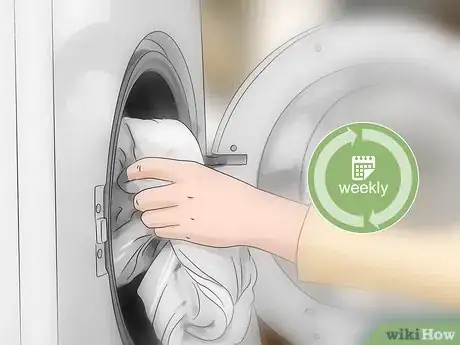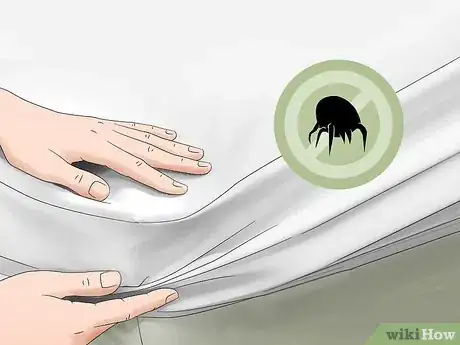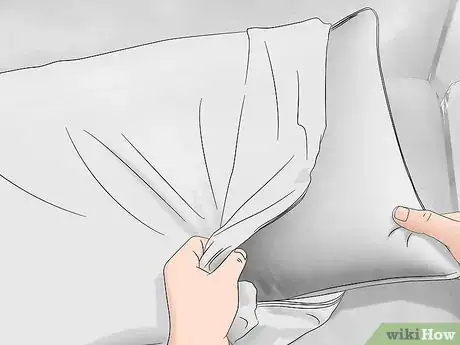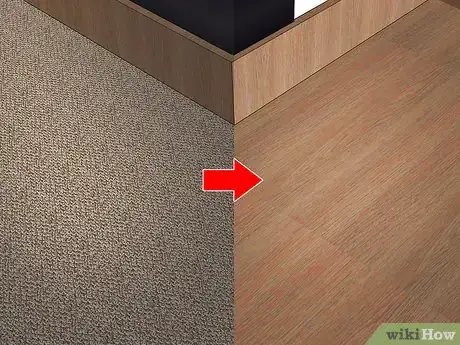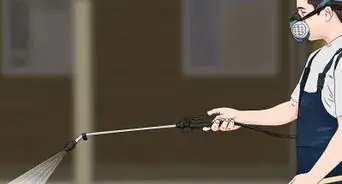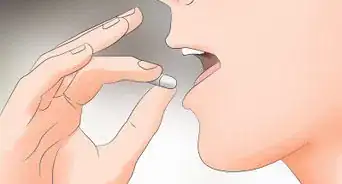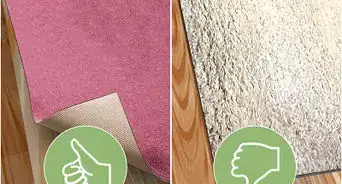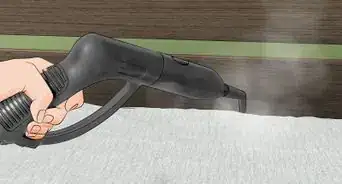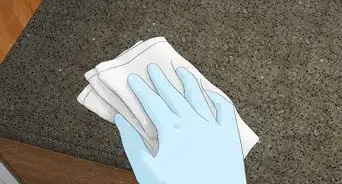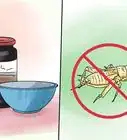This article was co-authored by Scott McCombe. Scott McCombe is the CEO of Summit Environmental Solutions (SES), a family-owned local pest solutions, animal control, and home insulation company based in Northern Virginia. Founded in 1991, SES has an A+ rating with the Better Business Bureau and has been awarded “Top Rated Professional,” and “Elite Service Award" by HomeAdvisor.
There are 10 references cited in this article, which can be found at the bottom of the page.
This article has been viewed 43,142 times.
If you're allergic to dust mites, you probably wake up every morning wishing there were something you could do to get rid of them. The good news is, a little cleaning and reorganizing can do a lot to improve your mornings. Kill mites by cleaning your bedding in hot water, and buy cases for your mattress and pillows. Keeping dust and humidity down in your bedroom will help discourage mites from proliferating, and putting a filter in your central air will help keep them out of your home.
Steps
Getting Dust Mites Out of Your Bed
-
1Wash your bedding with hot water weekly. Put your sheets, pillowcases, and blankets through the wash once a week. Wash them in water that is at least 130 °F (54 °C).[1] Cooler temperatures will not kill off the mites.[2]
- If you own bedding that cannot be washed hot, put it in the dryer for 15 minutes at 130 °F (54 °C) or higher to kill the mites.
- Dry your bed linen in the dryer. Dust and pollen land on line-dried sheets.
- Clean comforters and pillows 2-4 times a year.
-
2Cover your mattress and bedding with dust-proof cases. Buy dust-proof, or "allergen-impermeable," covers that zip to completely seal your pillows and mattress. Opt for mattress covers that will encompass your entire bed, including your box spring. Get covers for your pillows and for your comforter as well. Clean your covers as specified by the manufacturer.[3]
- Covers made of non-porous fabrics such as vinyl or plastic tend to be cheaper, and are highly effective. However, they are likely to make your bed feel hot and stuffy.
- For an effective and breathable option, consider a microfiber polyester cover, a cotton cover with a laminated nylon layer, or even a very tightly woven cotton cover with a high thread count.[4]
Advertisement -
3Get rid of old bedding. If you have had the same pillows and mattress ever since you could remember, it's time to dispose of them. Replace your pillows every 5 years, and your mattress every 10 years.[5]
- Get rid of your mattress by trashing it or recycling it. To recycle your mattress, contact the manufacturer for help, or get in touch with your local recycling center.
- If your mattress and pillows are still in good shape, consider giving them to someone you know who isn't allergic to dust mites. Remember, dust mites are only a problem for people who are allergic to them.
-
4Replace your old bedding with hypoallergenic options.[6] Latex pillows and mattresses are inhospitable to dust mites. Latex can be expensive, and not everyone finds it comfortable, so be sure to spend time testing it out in the store before you bring it home.[7]
- If you don't like latex pillows, opt for wool or silk pillows, as these are less friendly to dust mites than cotton and down.
-
5Remove any excess objects from your bed. Stuffed animals, decorative pillows and other fabric objects can become infested with dust mites. Launder what you have in hot water. Store these objects in another room, if possible, as any fabric in your room is liable to affect your allergy.
Controlling the Conditions of Your Bedroom
-
1Dust and vacuum your bedroom frequently. If you are allergic to dust mites, buy a filtering mask at a drug store to protect your nose and mouth. Dust and vacuum every week, and mop hardwood floors. Stay out of your bedroom for a while after you have cleaned to let the dust settle.[8]
- Ask someone without a dust-mite allergy to clean for you! If someone without an allergy cleans the room, they don't have to worry about the mask. Dust mites are not harmful to people without allergies.
- Some people sprinkle baking soda on their mattresses and rugs and then vacuum it up. This may help reduce dust mites, though it hasn't been proven.[9]
-
2Buy a HEPA filter for your vacuum if it doesn't come with one.[10] These filters prevent dust mites and their waste from getting back into the air after you have vacuumed. Buy a filter at an allergy supply store or at an online vacuum retailer.[11]
- Using a vacuum without a HEPA filter can actually worsen your problem, spreading the dust mites from one surface to another.
-
3Remove carpeting and other fabrics from your bedroom. Any fabric you can't regularly wash with hot water is a breeding ground for mites. Replace fabric curtains with roll-up shades. If you can afford it, strip wall-to-wall carpeting and replace it with hardwood, tile, or linoleum floors.[12]
- Because you can't launder wall-to-wall carpeting, it can be hard to drive dust mites from it.
-
4Clean your rugs frequently. Kill the dust mites in your rugs by sprinkling detergent on them, whacking them with a broom, hosing them down, and drying them in the sun for at least three hours. Don't bring a wet rug back into the house, as moisture helps dust mites thrive.
- Alternatively, get your carpets steam-cleaned every two months.[13]
-
5Lower the humidity in your room.[14] Use an air conditioner or a dehumidifier to lower the moisture levels in your room. Mites love moisture. Measure the humidity in your room with a hygrometer (a device you can buy at hardware stores). If it is above 50 percent, run a dehumidifier or an air conditioner until it has fallen to below 50 percent.[15]
-
6Get a high-efficiency media filter for your central heat and air conditioning unit. These filters trap dust mites and prevent them from spreading through your home. Buy a filter with a Minimum Efficiency Reporting Value (MERV) of 11 or 12. Install the filter and keep the fan running.[16]
- Change your filter at least every three months, or whenever it seems dirty or clogged.[17]
-
7Purchase a portable air-purifier. A small air purifier with a HEPA filter, or a MERV between 7 and 13, can help. While portable air purifiers will help, some dust mite particles will be too small, or will settle too quickly for the purifer to pick up.[18]
Expert Q&A
-
QuestionHow can I naturally get rid of dust mites?
 Scott McCombeScott McCombe is the CEO of Summit Environmental Solutions (SES), a family-owned local pest solutions, animal control, and home insulation company based in Northern Virginia. Founded in 1991, SES has an A+ rating with the Better Business Bureau and has been awarded “Top Rated Professional,” and “Elite Service Award" by HomeAdvisor.
Scott McCombeScott McCombe is the CEO of Summit Environmental Solutions (SES), a family-owned local pest solutions, animal control, and home insulation company based in Northern Virginia. Founded in 1991, SES has an A+ rating with the Better Business Bureau and has been awarded “Top Rated Professional,” and “Elite Service Award" by HomeAdvisor.
Pest Control Specialist Start by washing your sheets and bedding in water that's at least 130°F to kill the mites. You can also get rid of them on surfaces with a HEPA-filtered vacuum.
Start by washing your sheets and bedding in water that's at least 130°F to kill the mites. You can also get rid of them on surfaces with a HEPA-filtered vacuum.
References
- ↑ Scott McCombe. Pest Control Specialist. Expert Interview. 19 November 2019.
- ↑ https://www.mayoclinic.org/diseases-conditions/dust-mites/diagnosis-treatment/drc-20352178
- ↑ http://www.aafa.org/page/dust-mite-allergy.aspx
- ↑ http://www.goodhousekeeping.com/home-products/allergy-control-product-reviews/a18898/anti-allergy-bedding/
- ↑ https://www.ctvnews.ca/5things/your-pillows-are-filled-with-dust-mites-here-s-when-to-toss-them-1.2857348
- ↑ Scott McCombe. Pest Control Specialist. Expert Interview. 19 November 2019.
- ↑ https://www.allergybuyersclub.com/learning/hypoallergenic-bed-dust-mite-cover-guide.html
- ↑ http://www.aafa.org/page/dust-mite-allergy.aspx
- ↑ https://www.ncbi.nlm.nih.gov/pubmed/8027495
- ↑ Scott McCombe. Pest Control Specialist. Expert Interview. 19 November 2019.
- ↑ http://www.aafa.org/page/dust-mite-allergy.aspx
- ↑ http://www.aafa.org/page/dust-mite-allergy.aspx
- ↑ https://www.slhd.nsw.gov.au/rpa/allergy/resources/allergy/dustmiteallergy.pdf
- ↑ Scott McCombe. Pest Control Specialist. Expert Interview. 19 November 2019.
- ↑ https://www.mayoclinic.org/diseases-conditions/dust-mites/diagnosis-treatment/drc-20352178
- ↑ https://www.mayoclinic.org/diseases-conditions/dust-mites/diagnosis-treatment/drc-20352178
- ↑ https://www.energystar.gov/index.cfm?c=heat_cool.pr_hvac
- ↑ https://www.epa.gov/indoor-air-quality-iaq/guide-air-cleaners-home
About This Article
Dust mites in your bed can be annoying, but fortunately, you can get rid of them by keeping it clean and controlling the humidity. Wash your bedding with hot water every week to get rid of dust mites. You should also dust and vacuum your room regularly. If you have a rug in your room, clean this regularly too, since dust mites tend to linger on fabric. If your bedding is over 5 years old, consider replacing it to make sure it's not infested with dust mites. Dust-proof and hypoallergenic sheets will be the best for keeping dust mites away. Aim to replace your mattress every 10 years too. It’s also important to use an air conditioner or a dehumidifier to lower the moisture levels in your room, since dust mites thrive in humid environments. For more tips, including how to prevent dust mites from getting back into the air after you have vacuumed, read on.
